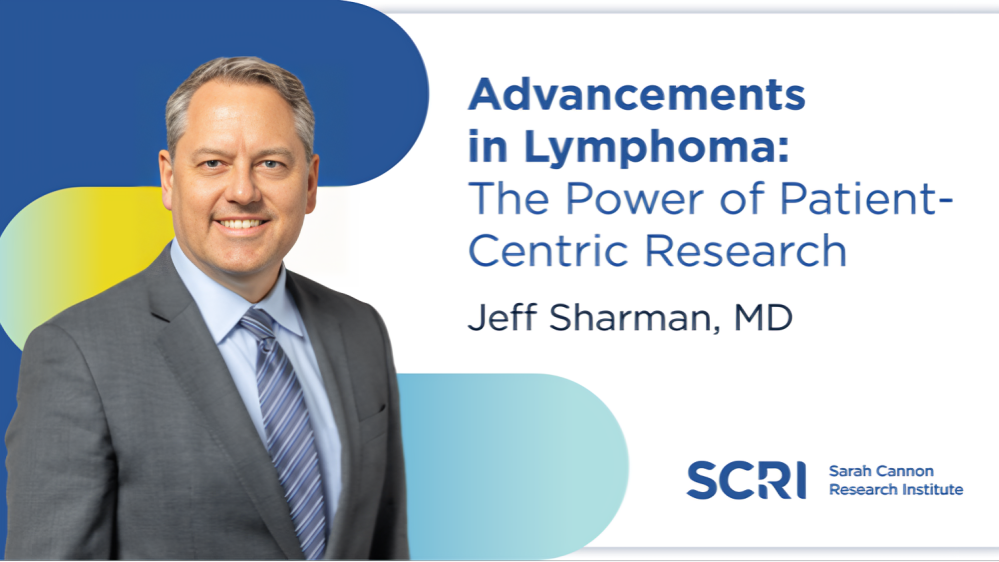Jeff Sharman, Medical Director for Hematology Research at US Oncology, shared a post on LinkedIn, about recent article published on his LinkedIn:
”As we recognize Blood Cancer Awareness Month, I’m reflecting on the incredible progress we’ve made in lymphoma research, and the lives we’ve touched through our work locally Willamette Valley Cancer Institute and Research Center in collaboration with Sarah Cannon Research Institute and The US Oncology Network. From cutting-edge clinical trials to groundbreaking treatments, we’re bringing hope closer for countless patients.”
Quoting Jeff Sharman’s article:
”Advancements in Lymphoma: The Power of Patient-Centric Research.
Every September, as Blood Cancer Awareness Month comes around, I find myself reflecting on the incredible journey we’ve taken in the field of lymphoma research—a journey filled with challenges, breakthroughs, and a relentless drive to improve the lives of those battling this challenging disease. Behind every diagnosis of lymphoma is a person with a story—stories of resilience, fear, hope, and determination. As someone who has dedicated his life to understanding and treating this disease, I am continuously inspired by these individuals as they are the reason I remain committed to pushing the limits of what we know and how we can continue to drive progress.
The Journey of Discovery and Hope
Consider this: Non-Hodgkin’s Lymphoma (NHL) is one of the most common types of cancers in the United States, affecting more than 808,000 people alone in 2021. While 10 years ago, treatment options were limited and outcomes uncertain, the advances we’ve made in the last decade are nothing short of remarkable. These breakthroughs, however, didn’t come easily. They are the culmination of years of thorough research, clinical trials, and the unwavering dedication of scientists, doctors, and, most importantly, the contributions of patients.
I always believed that if we could understand the disease better, we could develop more effective and targeted therapies. This belief has guided my work and the work of so many dedicated professionals in this field.
Groundbreaking Advances in Treatment
Today, we are in an era where hope is becoming reality for many lymphoma patients. New treatments are revolutionizing how we approach blood cancers, offering patients not just hope, but real, tangible improvements in outcomes.
One of the most promising developments has been the rise of CAR T-cell therapy. This innovative approach re-engineers a patient’s own immune cells to target and destroy cancer cells. The results we’ve seen are nothing short of extraordinary, with many patients achieving remission after other treatments have failed.
Another area of great promise is the ongoing research into the genetic underpinnings of lymphoma. By understanding the specific genetic mutations that drive different types of lymphoma, we’re now able to tailor treatments to the individual patient. This precision medicine approach means that we’re not just treating the disease, but we’re treating the patient in the most personalized way possible – what is to be the standard for the future of cancer treatment.
The Future of Lymphoma Treatment
With the significant strides made in the field, the outlook for the future of lymphoma research is more promising than ever. We’re just beginning to understand the potential of combining therapies—like using immunotherapy in conjunction with targeted drugs—to enhance their effectiveness. This combination approach could be the key to unlocking even better outcomes for patients.
But it’s not just about the science. It’s about the people. The patients who participate in clinical trials, the families who support them, and the colleagues who work alongside me in this field. Their courage and dedication inspire me to keep pushing forward, to keep searching for better answers.
One of the aspects I’m most proud of is the work we do at Willamette Valley Cancer Institute and Research Center, in collaboration with Sarah Cannon Research Institute to bring cutting-edge clinical trials closer to patients in underserved regions, especially in the Oregon coast. For many, access to these trials can be life-changing, offering new hope when other treatments have failed. By expanding the reach of these trials to clinics like Willamette Valley Cancer Institute and Research Center, we’re ensuring that more patients, no matter where they are, have the opportunity to benefit from the latest innovations in lymphoma treatment.
Raising Awareness and Supporting Research
I want to extend my deepest gratitude to every patient, researcher, or healthcare provider who has been part of this journey—whether by participating in a clinical trial, sharing their story, or simply by fighting every day. It is through our collective efforts that we’ve been able to achieve so much, and it is through these efforts that we will continue to make strides in lymphoma research and treatment.
As we observe Blood Cancer Awareness Month, I encourage everyone to take a moment to learn more about blood cancers. Support the research, advocate for early detection, and understand the signs and symptoms. Awareness is the first step toward change, and together, we can make an impact.”
Source: Jeff Sharman/LinkedIn


